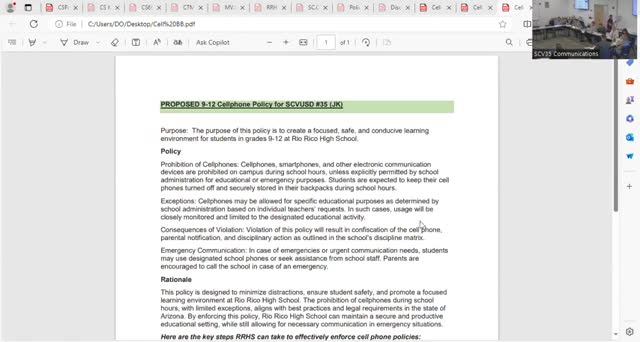Cell phone ban sparks debate among educators and administrators
June 12, 2024 | Santa Cruz Valley Unified District, School Districts, Arizona

This article was created by AI summarizing key points discussed. AI makes mistakes, so for full details and context, please refer to the video of the full meeting. Please report any errors so we can fix them. Report an error »

In a recent school board meeting, educators and administrators engaged in a robust discussion regarding the use of cell phones during school hours. The primary focus was on the proposed policy changes that would allow for more flexibility in cell phone usage for educational purposes, rather than enforcing a strict ban.
One teacher emphasized the importance of allowing educators to determine when cell phones could be utilized in the classroom, arguing that an outright ban could hinder teaching effectiveness. \"If you ban cell phones, it's a ban. You can't give teachers or administrators leeway to determine when they should be used,\" he stated, advocating for a policy that would permit cell phone use under specific circumstances, such as during projects or emergencies.
The conversation also highlighted concerns about potential biases in decision-making by school administrators. Some educators expressed that allowing principals to grant permission for cell phone use could lead to inconsistencies and favoritism among staff. \"It puts the principals in a situation where it might be biased,\" one teacher noted, suggesting that a more standardized approach could alleviate these concerns.
The proposed policy included a tiered system for handling cell phone violations, with escalating consequences for repeated offenses. The first offense would result in confiscation of the phone, requiring parents to retrieve it after a week. However, some board members questioned the practicality of this approach, suggesting that a shorter retrieval period might be more effective in maintaining communication with students.
Additionally, the discussion touched on the need for clear guidelines regarding the storage and handling of confiscated phones to mitigate liability concerns. One administrator raised the issue of potential damage claims when phones are confiscated, advocating for a system that ensures accountability and transparency during the process.
Overall, the meeting underscored a growing consensus among board members and educators that while cell phones should be restricted during school hours, there is a need for flexibility and clear communication regarding their use for educational purposes. The board plans to further refine the policy, taking into account the diverse perspectives shared during the meeting.
One teacher emphasized the importance of allowing educators to determine when cell phones could be utilized in the classroom, arguing that an outright ban could hinder teaching effectiveness. \"If you ban cell phones, it's a ban. You can't give teachers or administrators leeway to determine when they should be used,\" he stated, advocating for a policy that would permit cell phone use under specific circumstances, such as during projects or emergencies.
The conversation also highlighted concerns about potential biases in decision-making by school administrators. Some educators expressed that allowing principals to grant permission for cell phone use could lead to inconsistencies and favoritism among staff. \"It puts the principals in a situation where it might be biased,\" one teacher noted, suggesting that a more standardized approach could alleviate these concerns.
The proposed policy included a tiered system for handling cell phone violations, with escalating consequences for repeated offenses. The first offense would result in confiscation of the phone, requiring parents to retrieve it after a week. However, some board members questioned the practicality of this approach, suggesting that a shorter retrieval period might be more effective in maintaining communication with students.
Additionally, the discussion touched on the need for clear guidelines regarding the storage and handling of confiscated phones to mitigate liability concerns. One administrator raised the issue of potential damage claims when phones are confiscated, advocating for a system that ensures accountability and transparency during the process.
Overall, the meeting underscored a growing consensus among board members and educators that while cell phones should be restricted during school hours, there is a need for flexibility and clear communication regarding their use for educational purposes. The board plans to further refine the policy, taking into account the diverse perspectives shared during the meeting.
View full meeting
This article is based on a recent meeting—watch the full video and explore the complete transcript for deeper insights into the discussion.
View full meeting
